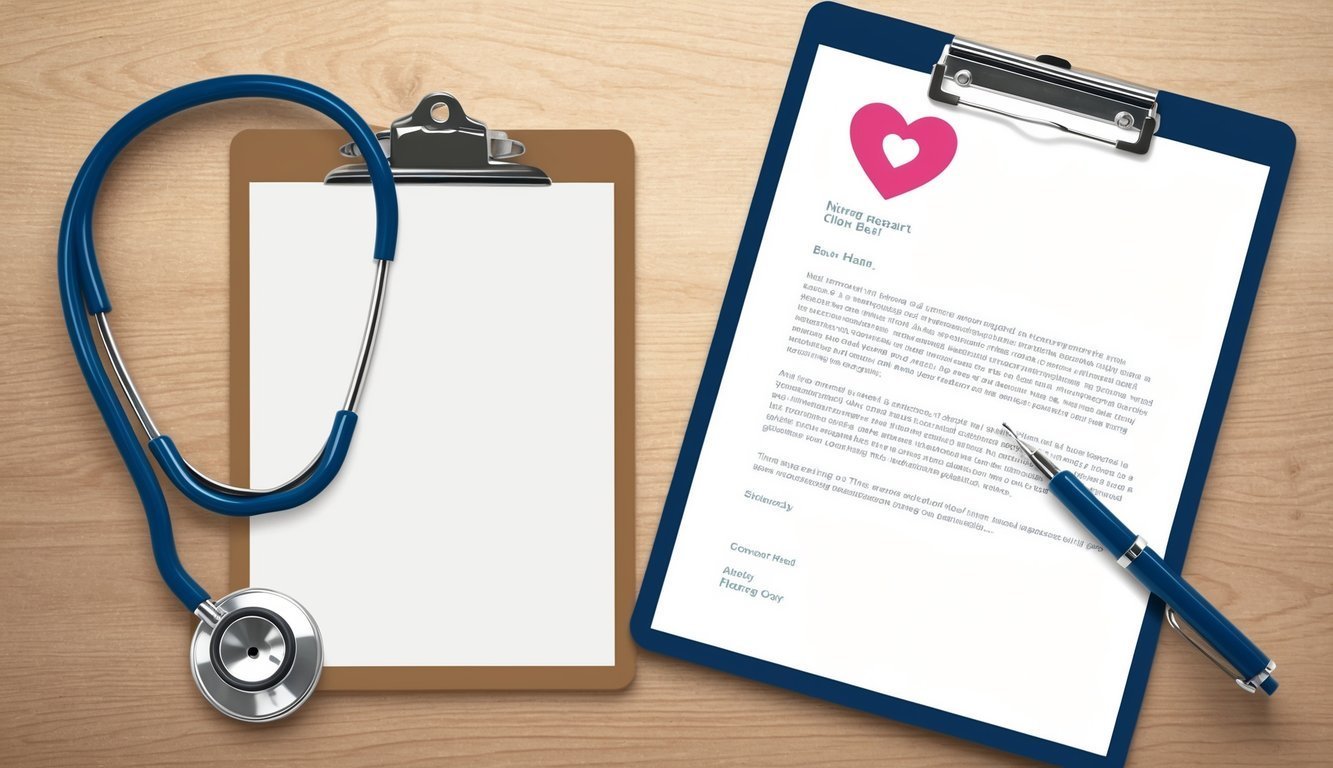Crafting a compelling nursing cover letter is crucial to making a strong first impression on potential employers.
A well-written cover letter not only highlights your qualifications but also conveys your passion for nursing, setting you apart from other candidates.
Understanding how to write a nursing cover letter that effectively showcases your skills and experiences can significantly enhance your job prospects.
Start by addressing the specific position you are applying for and aligning your qualifications with the job requirements.
Make sure to emphasize your relevant skills, experience, and what you can contribute to the healthcare setting.
By following best practices, such as tailoring your letter to each application, you can ensure your cover letter stands out.
To help you write a nursing cover letter that truly reflects your capabilities, resources like NurseJournal.org and Resume Genius offer valuable tips and templates.
These tools can guide you in structuring your letter effectively, allowing you to present your unique qualifications confidently.
Understanding the Nursing Cover Letter
A nursing cover letter serves as a critical introduction to your application.
It’s your opportunity to highlight your qualifications, showcase your nursing skills, and explain why you’re passionate about patient care.
The Purpose of a Cover Letter
The primary function of a nursing cover letter is to personalize your application.
It complements your nursing resume by elaborating on your nursing experiences and skills.
In your cover letter, you should:
- Express Interest: Clearly state why you want the nursing job.
- Highlight Relevant Experience: Mention specific nursing experiences that align with the position.
- Showcase Skills: Emphasize both hard and soft nursing skills that make you a strong candidate.
Employers appreciate when candidates connect their qualifications to the job description.
Use keywords from the job listing to demonstrate your fit.
Differences Between Nursing Cover Letters and Other Professions
Nursing cover letters have unique elements compared to other professions.
They focus heavily on patient care experiences and clinical skills.
Key distinctions include:
- Emphasis on Certifications: Mention any relevant nursing degrees and certifications.
- Patient-Centered Language: Use terminology related to patient care to illustrate your suitability.
- Professional Experience: Detail your nursing experience in different settings, such as hospitals or clinics.
These factors highlight your readiness for the nursing profession, reflecting the specific requirements of nursing roles.
It’s essential to tailor your cover letter to show you understand the nuances of nursing as a career.
Structuring Your Cover Letter
A well-structured cover letter is essential in capturing the attention of hiring managers in nursing.
It should showcase your qualifications and suitability for the position clearly, utilizing effective strategies in formatting and content.
Effective Opening Statement
The opening statement sets the tone for your cover letter.
Begin with a strong introduction that not only states the position you are applying for but also conveys enthusiasm for the role.
You can use a sample cover letter template for guidance.
State your name, contact information, and the date followed by the employer’s name and address.
Make your introduction engaging.
For example, mention a specific reason for your interest in the employer, such as their commitment to patient care or innovative healthcare practices.
This shows that you’ve done your research and are genuinely interested in joining their team.
Highlighting Your Nursing Skills and Experience
In this section, you should detail your relevant skills and experience that align with the job description.
Highlight your clinical experience, education, and any notable certifications that enhance your candidacy.
Focus on your communication skills and interpersonal skills, as these are crucial in nursing.
Mention specific instances where these skills helped improve patient outcomes or teamwork in a clinical setting.
Using a nursing cover letter template can help you format this section clearly.
Aim to connect your past roles with the requirements of the position, ensuring each point is tailored and relevant to the job at hand.
Using Bullet Points Strategically
Using bullet points can enhance readability and ensure that key information stands out.
Consider placing your most pertinent qualifications in a bullet format right after your introductory paragraph.
For instance, you might list:
- Relevant certifications such as BLS or ACLS
- Specializations like pediatrics, geriatrics, or critical care
- Leadership roles in past positions or volunteer work
By presenting information this way, you make it easy for hiring managers to quickly identify your strengths.
This structure emphasizes your qualifications without overwhelming them with long paragraphs.
Concluding With a Strong Call to Action
Wrap up your cover letter with a strong call to action to convey your eagerness for an interview.
Express your desire to discuss how your background can contribute to their team and enhance patient care.
Restate your enthusiasm for the role, encouraging the employer to reach out.
You might say something like, “I look forward to the opportunity to discuss how my skills and experiences align with the needs of your team.”
This conclusion reinforces your interest while inviting further dialogue, showing you’re proactive and motivated.
Customizing the Cover Letter

Customizing your nursing cover letter is essential for making a strong impression on potential employers.
This process involves conducting thorough research, addressing the hiring manager directly, and tailoring your content to meet job requirements effectively.
Researching the Hospital or Clinic
Start by gathering relevant information about the hospital or clinic where you are applying.
Investigate its mission, values, and recent achievements.
Understanding these aspects allows you to align your cover letter with their goals.
Key Elements to Research:
- Patient outcomes: Show your awareness of their commitment to high-quality care.
- Healthcare quality initiatives: Reference initiatives that you support or have experience with.
- Team dynamics: Highlight how you can enhance the existing team.
By integrating specific knowledge about the organization, you demonstrate genuine interest and fit for the nursing job.
Addressing the Hiring Manager Directly
Whenever possible, find the name of the hiring manager and address your cover letter directly to them.
This personal touch signifies that you have taken the time to learn about the organization and indicates your enthusiasm for the position.
Using a specific name rather than a generic greeting makes your letter stand out.
You can say:
- “Dear [Hiring Manager’s Name],”
- “Attention: [Nursing Manager’s Name],”
Addressing the letter to the appropriate individual enhances personalization, which can leave a lasting impression.
Tailoring Content to Job Requirements
Each nursing job comes with specific qualifications and responsibilities that you must address in your cover letter.
Carefully analyze the job description and identify keywords and essential skills.
Focus on:
- Relevant skills: Highlight both hard and soft skills that apply to the position.
- Clinical experience: Discuss your previous roles and how they prepare you for this new opportunity.
- Specific examples: Provide anecdotes illustrating your ability to enhance patient outcomes or collaborate effectively as a team member.
Customizing content shows your understanding of the role and reinforces your suitability for the position.
Avoiding Common Pitfalls
Crafting a nursing cover letter requires attention to detail and professionalism.
You can elevate your application by steering clear of common mistakes, ensuring consistency, and meticulously proofreading your document.
Steering Clear of Generic Language
When writing your nursing cover letter, avoid generic phrases that fail to illustrate your unique skills.
Instead of saying, “I am a dedicated nurse,” specify your commitment by stating, “I have successfully managed patient care for diverse populations in high-pressure environments.”
Tailoring your message to the specific position enhances your chances of catching the employer’s attention.
Use keywords relevant to the job description that align with your experience.
For example, mention your proficiency with electronic health records or your experience in patient education.
This personalized approach makes your cover letter stand out in a competitive field.
Ensuring Consistency and Professionalism
Your cover letter should match the tone and formatting of your resume for a professional appearance.
Consistency in font style, size, and overall design creates a cohesive look.
For instance, if your resume is in a modern font, ensure your cover letter mirrors that choice.
In addition to formatting, maintain a professional tone throughout.
Avoid casual language or overly personal anecdotes.
Instead, focus on your skills and how they pertain to the job.
Structured paragraphs that highlight your qualifications enhance readability and impress potential employers.
Proofreading to Avoid Errors
Attention to detail is critical in your nursing cover letter.
Grammatical errors and typos can undermine an otherwise strong application.
Before submission, take the time to proofread for any mistakes.
Consider reading your letter out loud to catch awkward phrasing or overlooked errors.
Using tools such as spelling and grammar checkers can be helpful, but don’t rely solely on them.
Having a trusted colleague review your cover letter can provide valuable feedback.
This extra set of eyes may catch issues you might have missed and will reinforce the professionalism of your application.
Advanced Tips for New Graduates

As a new graduate, your nursing cover letter is a crucial tool in marketing your skills and experiences.
Focus on showcasing your clinical rotations and the academic achievements that set you apart, as well as building on any internship or volunteer experiences you may have.
Leveraging Clinical Rotations and Academic Achievements
Your clinical rotations are more than just a graduation requirement; they are valuable experiences that demonstrate your proficiency in nursing skills.
Highlight specific skills you acquired during these rotations, such as patient assessment and critical thinking.
In your cover letter, refer to notable academic accomplishments.
For example, if you excelled in courses related to emergency care or pediatrics, mention them to showcase your well-rounded knowledge.
Customizing your cover letter with concrete examples gives hiring managers insight into your clinical capabilities, separating you from other applicants.
Building on Internship and Volunteer Experience
Your nursing cover letter can be significantly enhanced by internships and volunteer experiences.
They illustrate your commitment to healthcare and your ability to work in diverse settings.
List any relevant experiences that developed your nursing soft skills.
These include teamwork, problem-solving, and effective communication.
For example, if you volunteered at a community clinic, describe how you participated in patient care or health education initiatives.
Specific examples reflect your hands-on experience and dedication.
Use cover letter samples to structure these experiences effectively.
This ensures that you convey the depth of your involvement and its relevance to the nursing role you seek.

